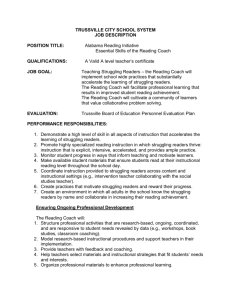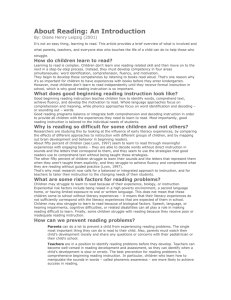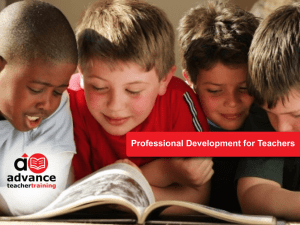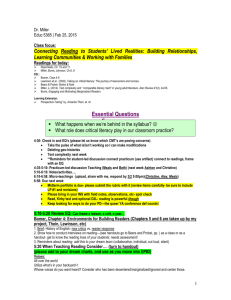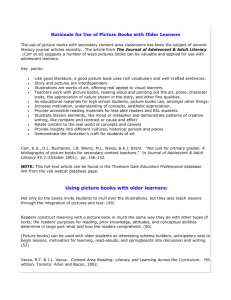Literacy Work Stations
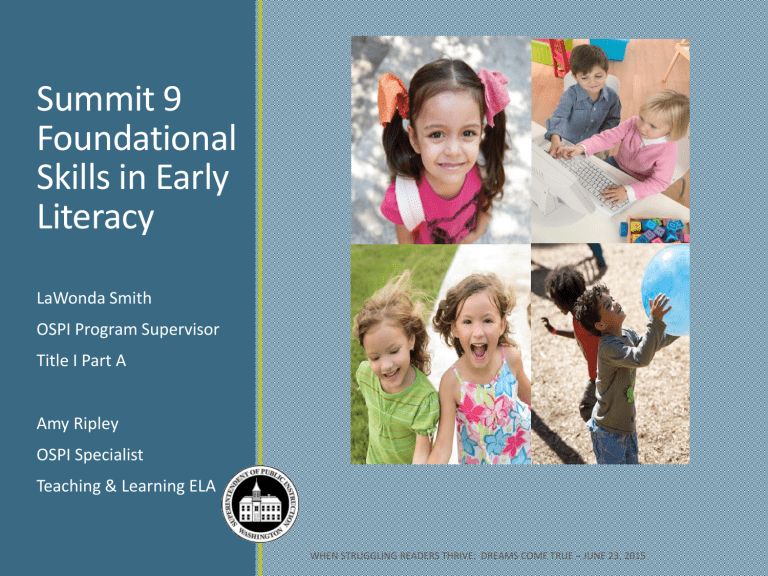
Summit 9
Foundational
Skills in Early
Literacy
LaWonda Smith
OSPI Program Supervisor
Title I Part A
Amy Ripley
OSPI Specialist
Teaching & Learning ELA
WHEN STRUGGLING READERS THRIVE: DREAMS COME TRUE – JUNE 23, 2015
THE
WASHINGTON
VISION
Every Washington public school student will graduate from high school globally competitive for work and postsecondary education and prepared for life in the
21
st
century.
STRUGGLING READERS SUMMIT 8 2015
Foundational Skills In Early Literacy Goals
• Understand system-wide development of Foundational
Reading Skills for early learners
• Common Core State Standards
• Incorporate best practices for early literacy instruction
• Operationalize socio-emotional culturally responsive pedagogy
• Familiarize participants with resources that support early literacy
STRUGGLING READERS SUMMIT 2015
The Comprehensive Literacy Plan
• The Comprehensive Literacy Plan for Birth to 12
• Expanded definition of literacy
• Integrates the Common Core State Standards
• Supports a multi-level instructional framework
STRUGGLING READERS SUMMIT 2015
Washington’s Approach To Literacy
Foundational reading skills, in literacy are paramount before students can move to conventional literacy.
An improved vocabulary and higher order thinking
(comprehension) are the result.
Emergent Early
LITERACY
Conventional
STRUGGLING READERS SUMMIT 8 2015
Structure
Whole-Group
Small-groups
One-on-one
Grouping Structures for Instruction
What?
Who and When?
Why?
Phonics
Phonemic
Awareness
Fluency
Core program
All students
Every day (30-45 minutes)
Teach grade level material
oral language vocabulary
Model strategies/skills
Focus on specific skills and strategies
Scaffold/support
Pre-teach, re-teach, explicit work on
Foundational Skills
Flexible groups with similar needs
Lower readers meet more often
20-30 minutes
Assess, conference
Listen to reading
All students at least once a week (3-5 min)
Progress monitoring
Touching base about reading
5 Powerful Questions Teachers Can Ask
If you are like many of us, question-asking is one area in which you might wish to grow. Start tomorrow with these five:
1. What do you think?
2. Why do you think that?
3. How do you know this?
4. Can you tell me more?
5. What questions do you still have?
How do you ask questions in your classroom, and what have you found that works well?
www.edutopia.org/five -powerful -questions-teachers-ask-students-rebecca-alber
Literacy Work Stations & Traditional Centers
Literacy Work Stations
• Teacher models with materials
• Reflect reading levels, familiar strategies, and topics
• Year-long stations with daily visits
• Differentiated materials
Traditional Centers
• Random materials
• Changed weekly
• Only if work is finished
• Same activities
• Teacher prepares
• Small groups do the same activity
STRUGGLING READERS SUMMIT 2015
Elements of Effective Work
Stations
Listening
ABC/
Word
Work
Classroo m Library
Content
Area
Writing
Big Books or Pocket
Chart
Phonemic Awareness
Cognitive Strategy: Bead Counting
Purpose:
To assist students in blending and segmenting phonemes.
Process:
1. Make individual bead strings with six beads on a long cord.
2. String the beads on the cord and tie a knot at the end.
3. Call out a word card from a deck of word cards.
4 .Have students use their bead counters to count the number of phonemes in the word.
Variation: Stack unifix cubes, use bingo chips with Elkonin Boxes,
Finger/body tapping, etc.
-Lane & Pullen, 2004
Fluency
Accuracy, intonation, rate
Choral Reading – entire class reads one text in unison
Refrain – One student reads most of text, and the whole group chimes in to read key segments chorally
Echo – Teacher reads first, then students echo chorally
Cloze – Teacher reads aloud and stops; then students finish the sentence or the missing word.
- Rasinski, 2003
Phonics
Cognitive Strategy: Word Pockets
Purpose:
To assist students in word building.
Process:
1. Distribute word pockets and letter cards to students.
2. Use large pocket chart to model word building procedure.
3. Students build words using their letter cards and individual word pockets
-Lane & Pullen, 2004
Get Ready…Get Set…Go!
• Train students in rules, routines, and structure
• Practice and build stamina
• Begin literacy work stations, one at a time
• Once students are functioning well at work stations then the teacher will be able to implement small-group differentiated instruction.
• Begin with only one group during the independent work time, then gradually add another.
•
•
•
Think back to the beginning…
Focus on the System-Wide Development,
Delivery, and Diverse Learners
Literacy
Development
Social Emotional
Balance
Core Instruction
Big Five
Small Groups
Literacy Work
Stations
Vocabulary
Development
Comprehension
Closing the
Opportunity Gap
STRUGGLING READERS SUMMIT 2015
Culturally Responsive Pedagogy
Is the achievement gap a function of poverty or race?
STRUGGLING READERS SUMMIT 2015
Opportunity Gap
. . . opportunity gap refers to inputs—the unequal or inequitable distribution of resources and opportunities—while achievement gap refers to outputs—the unequal or inequitable distribution of educational results and benefits.
STRUGGLING READERS SUMMIT 2015
Hidden curriculum (2014, August 26)
Achievement Gap and Vocabulary
Meaningful Differences in the Everyday Experience of Young American Children
Betty Hart and Todd R. Risley, Brookes Publishing, 1995 (4 th printing, January 2003)
Age 3 to Third Grade Accomplishments
Dale Walker, recruited 29 of the 42 families to participate in a study of their children's school performance in the third grade, when the children were nine to 10 years old.
It was discovered that accomplishments at age 3 predicted measures of language skill at age 9-10. http://www.aft.org/ae/spring2003/hart_risley
STRUGGLING READERS SUMMIT 2015
Culturally Responsive Teaching
Geneva Gay
(Culturally Responsive Teaching, 2000) defines culturally responsive teaching as using the cultural knowledge, prior experiences, and performance styles of diverse students to make learning more appropriate and effective for them; it teaches to and through the strengths of these students.
Conceptual
Framework
Equity and
Excellence
Student
Support
Culturally
Relevant
Pedagogy
Developmental
Appropriateness
Teaching the Whole
Child
Identity and
Achievement
Brown-Jeffy, Shelly & Cooper, Jewell E . Toward a Conceptual Framework of Culturally Relevant Pedagogy: An
Overview of the Conceptual and Theoretical Literature.
Teacher Education Quarterly, Winter 2011.
Intervention Goal
“Because the goal of an intervention would be to equalize children's early experience, we need to estimate the amount of experience children of different SES groups might bring to an intervention that began in preschool at age 4.”
STRUGGLING READERS SUMMIT 2015 http://www.aft.org/ae/spring2003/hart_risley
How might your current instruction and/or intervention goal for struggling/vulnerable learners adjust in consideration of poverty and/or race?
STRUGGLING READERS SUMMIT 2015
Resources Support Literacy for ALL Kids
Great reading, writing, and communication practice.
Targeted and useful assessments to gauge literacy skills and drive instructional choices.
ESSB 5946:
◦ Communicate with parents
◦ Support teachers’ careful attention to learning trajectories.
◦ Build system-wide supports for each child needing extra assistance.
http://www.k12.wa.us/SSEO/pubdocs/ESSB5946AAG.pdf
STRUGGLING READERS SUMMIT 2015
Educator and Family
Resources
Your Child's Progress
STRUGGLING READERS SUMMIT 2015
Early Learning & Development Guidelines
Explore the early years of a child’s development.
Understand the whole child.
Maximize each child’s learning potential.
STRUGGLING READERS SUMMIT 2015
Statewide Coordination and
Collaboration
Washington
STRUGGLING READERS SUMMIT 2015
Be More Awesome!
Be More Awesome
STRUGGLING READERS SUMMIT 2015
ELA/Literacy
Support
LaWonda Smith, Ed.D.
OSPI lawonda.Smith@k12.wa.us
Amy Ripley, MBA, Ed.M.
OSPI amy.ripley@k12.wa.us
General Email: corestandards@k12.wa.us
http://www.k12.wa.us
STRUGGLING READERS SUMMIT 2015
References
References
Diller, D. (2003). Literacy work stations: Making centers work.
Portland, Me.: Stenhouse.
Diller, D. (2007). Making the most of small groups:
Differentiation for all. Portland, Me.: Stenhouse.
Fountas, I. C., & Pinnell, G. S. (1996). Guided reading: Good
first teaching for all children. Portsmouth, NH: Heinemann.
Paratore, J. R., Cassano, C. M., & Schickendanz, J. A. (2011).
Supporting Early (and later) literacy development at home and at school. In M. L. Kamil (Author), Handbook of reading
research: Volume IV (Vol. IV, pp. 108-125). New York, NY:
Routeldge: Taylor and Francis Group.
University of Oregon: Center for Teaching and Learning.
(2015). Big ideas in beginning reading. Retrieved from http://reading.uoregon.edu/
STRUGGLING READERS SUMMIT 2015
